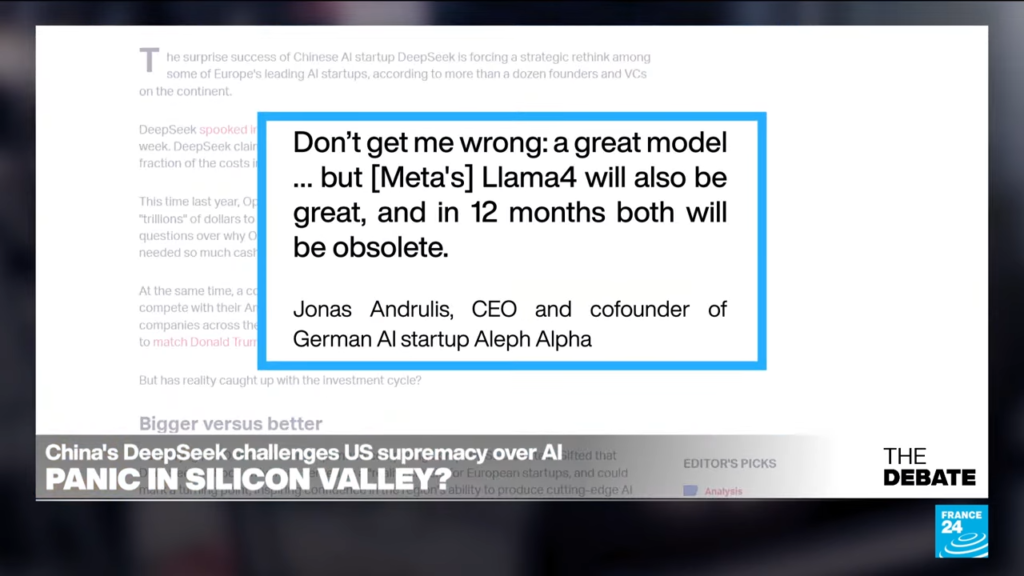Introduction
In a dramatic week for the global tech industry, a Chinese startup named DeepSeek sent shockwaves through Silicon Valley, challenging the dominance of American artificial intelligence (AI) giants. This development comes shortly after U.S. President Donald Trump announced a $500 billion investment to bolster AI infrastructure, including massive data centers. However, DeepSeek’s breakthrough model, reportedly 18 times cheaper to operate than GPT-4, raises questions about America’s AI supremacy, sparking debates on global competition, innovation, and the geopolitical implications of artificial intelligence.
This article explores the details of this unfolding saga, its implications for technology, business, and geopolitics, and what the future may hold for AI development across the globe.

As discussed in The Debate.
The Rise of DeepSeek: A Game-Changing Innovation
Breaking Silicon Valley’s Grip
DeepSeek, a Chinese AI startup, has emerged as a formidable competitor in the race to develop advanced AI models. Unlike traditional AI systems, DeepSeek’s technology is designed to perform complex reasoning tasks using significantly less computational power and lower-grade chips. This innovation challenges the long-held assumption that high-performance AI models require expensive, energy-intensive infrastructure.
Implications for Global AI Competition
DeepSeek’s model not only matches the capabilities of industry leaders like OpenAI’s GPT-4 but also introduces a disruptive cost structure. Its reliance on cheaper hardware could democratize AI access, making it possible for smaller nations and companies to adopt advanced AI technologies without the resources of a Silicon Valley tech giant.
This development has also exposed vulnerabilities in the U.S. tech sector, evidenced by the record $590 billion loss in Nvidia’s market value—an event being called the “Sputnik moment” for AI.
The Geopolitical Stakes: AI as the New Battleground
A Shift in Power Dynamics
The rise of DeepSeek has intensified the geopolitical race to control AI technology. For decades, the United States has been the global leader in artificial intelligence, thanks to Silicon Valley’s ecosystem and access to cutting-edge semiconductor technology. However, DeepSeek’s advancements signal a shift, with China positioning itself as a serious contender in the AI arms race.
The Democratization vs. Militarization Debate
The affordability of DeepSeek’s AI model opens up opportunities for widespread adoption, but it also raises concerns about misuse. The model’s efficiency makes it possible to deploy advanced AI capabilities in applications ranging from defense technologies, such as autonomous drones, to information warfare through disinformation campaigns. This has led to fears of “epistemic warfare,” where AI could be used to manipulate societies and influence geopolitical outcomes.
Challenges for the U.S. and Europe
Energy Dependency and Infrastructure
The U.S. AI industry faces significant challenges in scaling its operations, including reliance on an outdated energy grid and dependence on advanced semiconductors. DeepSeek’s success in using less energy and lower-grade chips highlights the need for the U.S. to rethink its approach to AI development.
Europe’s Strategic Dilemma
Europe, too, finds itself at a crossroads. While it has the talent and resources to compete, fragmented strategies and bureaucratic inefficiencies have hindered progress. European policymakers must decide whether to collaborate on pan-European AI initiatives or continue with nationalistic approaches that may limit their competitiveness.
Future Outlook and Recommendations
For Businesses:
- Adapt to New Competition: U.S. companies must innovate and optimize resource use to compete with cost-efficient models like DeepSeek’s.
- Explore Collaboration: Tech companies in Europe and the U.S. should consider partnerships to share resources and expertise in AI development.
For Policymakers:
- Invest in Energy Infrastructure: Governments must prioritize modernizing energy grids to support sustainable AI growth.
- Promote Ethical AI Development: International cooperation is essential to establish guidelines that prevent misuse of AI in disinformation or warfare.
For the Global Community:
- Leverage AI Democratization: DeepSeek’s model could provide smaller economies with access to advanced AI, fostering innovation and leveling the playing field.
- Prepare for Disruption: Companies and governments must be proactive in addressing the societal and economic disruptions caused by AI advancements.

Conclusion
The emergence of DeepSeek as a major player in the AI industry underscores the transformative potential of innovation, even in the face of established giants. While the democratization of AI offers immense opportunities, it also raises complex ethical and geopolitical questions. The race for AI supremacy is not just about technology—it’s about shaping the future of global power dynamics, economies, and societies.
Follow-Up Questions:
- Can the U.S. regain its competitive edge in AI while addressing inefficiencies in its energy and semiconductor industries?
- How can international communities ensure ethical AI development in a fragmented geopolitical landscape?
- Will DeepSeek’s model inspire other nations to prioritize cost-efficient AI innovation?
Disclaimer
This article is based on insights from the France 24 English program titled “Panic in Silicon Valley? China’s DeepSeek challenges US supremacy over AI”. The content is intended for informational purposes only and does not constitute financial or technological advice. Readers are encouraged to consult professionals for specific guidance.


